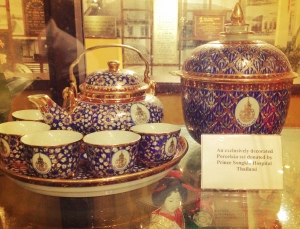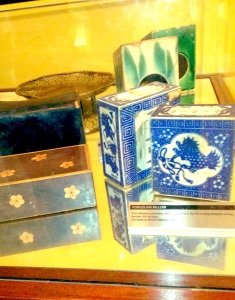Today I attended a funeral, my first since arriving on this island some 31 months ago. As Dad was in town he came along too, and so did my husband and son. We didn’t know the deceased personally, but we all felt welcome, as did everyone else in the city – for this was the funeral procession of Mr Lee Kuan Yew, ex-PM of Singapore and founding father of the city back in 1965. No doubt you will have heard of him this week, as news of his passing made headlines around the globe.
What a week. What a time to be living here in Singapore, what a time for my dad – social anthropologist, cultural scientist – to be visiting, and what a day for a funeral (grey and rainy, just as any good Cornish funeral should be: proper job).
Since Lee Kuan Yew’s death last Monday at 3.18am, many of us ‘visitors’ have been looking for signs of stress, outpourings of grief, overt reactions within this powerhouse of a city, whose preparations for the most exciting 50th birthday party in August have ground to a temporary and reverential halt as it absorbs the fact that its founding father will now not be in attendance. As the week wore on, and the queue for Parliament House grew, and more people began adopting the monochrome black and white ‘uniform’ to show unanimous respect, feedback and opinion started to appear.
I spent the week signing off emails to local businesses or acquaintances with a brief note of condolence, and generally received muted thanks back. Grandpa and SM wrote in a book of condolence set up at school, which, to its credit, took the news seriously enough to cancel all end-of-term celebration assemblies, to involve the children in discussions about LKY (SM came home last Monday reciting LKY’s name, birth, rank and funeral date), and to keep the school flags lowered to half-mast all week. I collect front covers of world events (if I ever did one of those What You Don’t Know About Me fact lists, that would be a good one) and I picked up a copy of Time magazine and one of the viewing queue from the Straits Times. I didn’t just want the pictures, though, I was looking for clues as to how to react, ways to pay my respects. What should we be doing, or saying? I read on.
One blogger posted a poignant piece about how she was in a cab when news of LKY’s death came out over the radio (announced bravely by his own son and current PM Lee Hsien Loong) and that when the words came over the radio, the cab driver turned up the volume and wiped away tears. Personal opinions of The Man peppered social media feeds all week, both good and not-so-good. If one FB page gave a heartfelt personal eulogy, another posted a cynical note about chewing gum. If one Twitter feed posed suggestive questions about Mr Lee’s style of governing, another talked about how hard it was to stand in the viewing queue for eight hours in 37C with no hint of a breeze, and reminded us why so many people were doing it. My most overused personal saying is that no one likes a success story, and this was never more evident than in some reviews bandied about during the week – from near and far, both on and off the island. But beside every critic comes a person who is simply sad to lose a parent; if I had to weigh up the most prominent opinion over the past few days, the arrow would point towards the latter.
So how to pay our respects as foreigners in a host country? How to soak up the flavour of this very intense week? How to react when the person who built the country you are living in has died? It’s a bit like being a guest at someone’s house when the host has been unwell, and subsequently doesn’t return home. Do you brew symbolic cups of tea and pour stiff drinks, turn a tactful deaf ear to the not-so-good stories, make yourselves absent, stay out all day and slink back at night, opting for the low-profile approach? Does it matter how you behave? It wasn’t as if everyone I knew was rushing to pray – were they? Just because I couldn’t see it didn’t mean it wasn’t happening. What about that viewing queue? What about all the local news stories showing definite signs of prayer island-wide, temples with black and white pictures up, white flowers at the door. What about all those rolling films on Media Corps screens at bus stops, constantly showing filmettes of his life? (Critics denounced this decision as yet another example of the nation being told what to think. I saw it as an oddity, worth reporting).
By now you will have gathered that I’m not clever or political enough to give a proper balanced opinion on the life and works of Mr Lee. I enjoy and appreciate life in the city LKY built and I won’t live anywhere like it again. I recognise what its faults are (and, OK, what His faults were), but after a day like today, I don’t really want to think about them. I apologise if I have overlooked an aspect of your own life or inheritance that has suffered as a result of His work. What I think I might do is just sneak in a link (below) that gives a far better summation than I ever could. I am writing this as witness, without opinion, if this can ever be done.
The last time I witnessed a public funeral was for Princess Diana’s procession in 1997. My then boyfriend and I ran down to a spot on London’s north circular, getting there only just in time to see the departing cortege, mourners lobbing lilies at the back windscreen, muted shouts muffled by the sizzling of fast tires on wet tarmac on a damp day not unlike this one. It was a very different feeling. The car was going much faster, the rain was much colder, very few people on that pavement would have been directly affected by Her, and of course Her death was a rather more complicated affair – it was all a bit of a downer, to be honest. Today’s crowds were upbeat, unanimously respectful, even in the midst of a downpour – especially so. We wore black and white under our plastic rain macs, trudged to a waiting spot just ten minutes from the condo. A guard shouted through a loud-hailer, warning the crowds that the cortege was about to pass. ‘I couldn’t hear him,’ said Dad, afterwards, ‘what did he say?’.
The man had shouted: ‘We are all here for the same reason. The procession is about to pass, so please take care, stay well back, pay your respects to Mr Lee in the way he would have wanted.’
Everyone had cheered and, in fact, done just what was asked. And although you could say that, yes, this was what some of the critics are, well, being critical of, I preferred to see it as a crowd working together especially hard on the very day in which it mattered more than ever. After the procession (which passed helpfully right under all of our noses) everyone packed into a local hawker for lunch and kopi, crowding into corners to watch TVs bolted high on the wall next to fans blasting through the steamy heat. We got our coffee to go, drizzling slowly home again through the rain, so glad to have seen it all up close, and then we spent the next two and a half hours watching the ten eulogies on our own telly at home.
One of my oldest friends once told me how privileged she felt to be at the passing of her mother. A few years later my husband found himself in the same situation and he agreed. Later still I joined that privileged club – not one you ever want to be part of, but one in which you become, always, nothing short of grateful to say you were there. What I’m trying and failing to say (in a post that is almost as long as today’s exquisitely delivered eulogies) is that every death deserves a modicum of respect, and if we get a chance to pay some – especially on a scale such as my family witnessed today – then perhaps we should always try to do so. Some opted out of the seven-day mourning period, did not wear black and white or join the queue, and they were vocal in their own defence, and irritated by the outpouring of love for a man that, actually, not everyone did love. Maybe I am justifying my own need to have gone along and witnessed the procession. I’m not really sure.
‘If you seek his monument,’ said Lee Hsien Loong in his eulogy, ‘look around you’.
When I think about my own privilege, I think about my Dad, who always says: ‘I’ve led a privileged life,’ and he was kind enough to pass that on to me: so have I. It’s a shame that, for some, Mr Lee’s monuments are not enough to dispel the negative aspects of his life. I can only give thanks for the city I’m enjoying, and which I suppose I will continue to enjoy until we leave.
Here’s that link, a Business Times piece from today, Sun 29 Mar 2015




